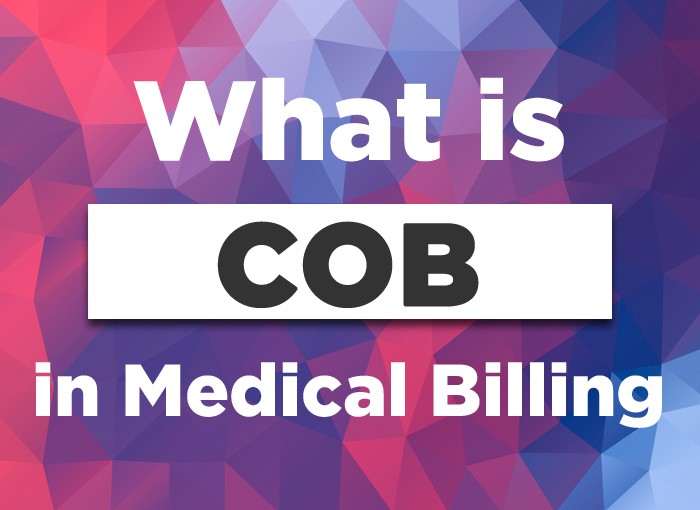What does COB mean in Medical Billing
The healthcare industry allows patients to enroll in multiple health health insurance plans as per their requirements. One such term is Coordination of Benefits (COB). As a person working in or navigating the healthcare industry, information COB is critical for making sure of correct billing and avoiding charge delays. Let’s dive deeper into what COB method in scientific billing, its significance, and the way it works in practice.
Definition of COB Coordination of Benefits
COB or Coordination of Benefits refers to the manner of figuring out a medical insurance company’s fame as a number one or secondary payer to provide medical claim blessings for a patient having more than one health insurance policy. The aim of COB is to make certain that healthcare companies are paid accurately whilst stopping reproduction bills by using insurance carriers.
For example, if a patient has both number one and secondary coverage, COB determines which insurer can pay first and what the secondary insurer’s duty is.
Why is COB Important?
Coordination of Benefits is important for numerous reasons:
- Avoiding Overpayments: Without COB, there’s a risk of insurance companies paying more than the actual value of care.
- Ensuring Proper Reimbursement: COB guarantees that healthcare vendors receive charge for the services they render without useless delays.
- Reducing Patient Confusion: Patients often find medical billing overwhelming. A clear COB manner minimizes confusion about who can pay what.
- Compliance with Regulations: Proper COB tactics assist insurance businesses and providers adhere to country and federal guidelines, averting potential criminal troubles.
Challenges in COB
While COB streamlines price procedures, it additionally comes with challenges:
- Inaccurate Insurance Information: Incorrect or outdated affected person coverage information can postpone claims processing.
- Complex Rules: Determining the order of advantages may be difficult, mainly with overlapping coverage.
- Claim Denials: Errors in COB can lead to denials, requiring resubmission and further work for the billing team.
- Patient Awareness: Patients are on occasion blind to their coverage details, making it more difficult to identify the best primary and secondary insurers.
How Does COB Work?
The Coordination of Benefits system entails the subsequent steps:
1. Identifying Multiple Insurances
Patients may have a couple of medical insurance plans for several motives, which include:
- Employment advantages from multiple jobs.
- Coverage under a spouse’s or figure’s coverage plan.
- Government packages like Medicare or Medicaid in addition to personal coverage.
It’s the responsibility of the medical billing team to collect entire coverage statistics through patient registration.
2. Determining the Primary Payer
The primary payer is the coverage enterprise liable for paying the majority of the declare. Factors figuring out the primary payer encompass:
- Employment Status: Insurance supplied by means of a company is typically primary.
- Age: For based kids blanketed underneath both mother and father’ plans, the birthday rule applies. The plan of the parent whose birthday comes in advance in the 12 months is number one.
- Medicare Secondary Payer Rules: Medicare is secondary if the affected person has different coverage.
3. Calculating Payment Responsibilities
After identifying the number one and secondary insurers, the COB process calculates how plenty every insurer owes. The primary insurer can pay as much as the limits of its insurance, and the secondary insurer can also cover remaining costs, along with copays or deductibles.
4. Communicating with Insurance Companies
Accurate and timely communique is essential. Providers should submit claims to the primary coverage first and then ahead with the explanation of advantages (EOB) to the secondary insurer.
Best Practices for Efficient COB
To avoid issues, observe the satisfactory practices:
1. Verify Insurance Coverage
Always verify a patient’s coverage info during every go-to. Confirm active insurance, policy numbers, and coordination policies.
2. Stay Updated on Regulations
Healthcare rules change frequently. Staying informed about COB policies allows certain compliance and clean claims processing.
3. Use Automated Systems
Modern billing software programs can streamline the COB procedure via:
- Flagging patients with multiple coverages.
- Automatically figuring out the primary and secondary insurers.
- Tracking claim statuses in actual time.
4. Train Staff
Ensure your billing crew is properly skilled in COB processes. Regular workshops and updates on insurance pointers can significantly enhance accuracy and efficiency.
Common COB Scenarios
Scenario 1: Dependent Child with Dual Coverage
Imagine a baby included below each mother and father’s insurance plans. The number one payer is decided using the birthday rule—the plan of the figure whose birthday takes place first within the calendar 12 months.
Scenario 2: Medicare and Employer Insurance
A patient with Medicare and employer-subsidized coverage will generally have the enterprise’s insurance as number one if the patient is actively hired. Medicare turns into secondary in this example.
Scenario 3: Accident-Related Claims
For accidents as a consequence of an accident, COB might contain legal responsibility insurance further than health insurance. The legal responsibility insurer normally pays first.
Key Takeaways
- COB in clinical billing ensures efficient coordination between more than one insurer, minimizing mistakes and delays.
- Understanding COB policies and enforcing nice practices can appreciably beautify billing accuracy.
- Automated tools and personnel training are useful in managing the complexities of COB.
In medical billing, mastering the Coordination of Benefits is more than only a technical requirement; it’s a cornerstone of monetary accuracy and patient satisfaction. By adhering to COB methods, healthcare vendors can optimize their revenue cycles whilst ensuring sufferers get hold of the full advantages in their insurance.



